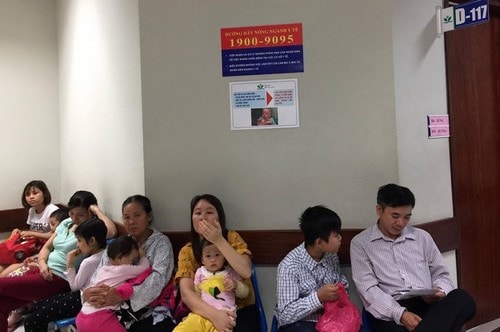Diseases to watch out for when the weather is 40 degrees
People with high blood pressure or heart or respiratory problems, children and the elderly need to take good care of their health during prolonged hot weather.
Every day, the Examination Department of the National Children's Hospital (Hanoi) receives about 3,200-3,500 pediatric patients for examination, mainly with viral fever, diarrhea, respiratory infections... The reason is determined by doctors to be because the temperature in the North is at a record high, sometimes over 40 degrees. ForecastIf the hot weather continues, the number of hospitalized children will increase.
Below are diseases that commonly attack people in hot weather, according to doctors.
Cardiovascular disease
Hot weather affects blood pressure, especially in people with chronic diseases, post-intervention patients, heart failure patients, etc. The disease can progress severely, the patient has acute pain, must go to the emergency room, and can even lead to stroke.Hot weather also causes people's living habits to change. Heart failure patients who drink more water will increase their circulating volume, leading to more severe failure.
Therefore, you should drink enough water, not too much, especially those who drink a lot without sweating. Patients with heart failure should control their water intake, drink when thirsty. People with chronic diseases must take medication regularly as prescribed, especially the elderly.
Respiratory diseases
Respiratory tract infections are often caused by children catching a cold. When children are hot, they sweat a lot and wet their clothes. If a strong fan is turned on directly on the body, the sweat will evaporate quickly, causing the temperature to drop, leading to a cold. In addition, turning the air conditioner temperature too low in the bedroom can also cause children to catch a cold.In such conditions, children are susceptible to acute pharyngitis, tonsillitis, bronchitis, pneumonia complications...
 |
Children waiting for examination at the National Children's Hospital. Photo: LT |
According to Dr. Nguyen Tien Dung, former Head of the Pediatrics Department, Bach Mai Hospital (Hanoi), houses with air conditioning should be set at 27-28 degrees Celsius. Note, do not set the air conditioning too low, the temperature difference is large compared to the outside environment (no more than 5 degrees Celsius). When in an air-conditioned room, children should not be allowed to run in and out of the room continuously, sudden changes in temperature can also make children susceptible to illness.
Depending on the age of the child, parents should turn on the fan at a high or low setting, but should not turn the fan too strong directly on the child. For newborns, the fan should not be placed too close, but kept at a distance of 2 meters or more, turned on the lowest setting, and should not be blown directly on the face. If the child sweats a lot, use a towel to dry the child, especially on the back. Limit children from drinking ice water, eating ice cream, or eating food directly from the refrigerator.
Sunstroke
Going or doing activities for a long time in the sun without wearing a hat, exposing the sun to the head, neck and exposed parts of the body can cause heatstroke. When you have mild heatstroke, you will feel tired, dizzy, dizzy, have ringing in the ears, sometimes nausea or vomiting. The body temperature may increase higher than normal. If the heatstroke is severe, the victim may have impaired reflexes, sometimes convulsions.
Treatment is to move the patient to a cool, airy place, loosen their clothing, use a towel soaked in cool water to cover the body, and give them plenty of water. In some cases, the patient needs to be taken to the nearest medical facility.
Skin diseases
In hot weather, children sweat a lot. If they do not pay attention to bathing, maintaining good hygiene, and cleaning their skin, they will easily get dermatitis. The harsh sunlight will affect the body's ability to cool itself and cause dehydration. It is also the "culprit" causing harm to the skin.
When going outdoors, people should wear sunglasses and choose appropriate clothing; choose cotton clothes, light-colored and loose-fitting. If forced to go outside, wear a wide-brimmed hat, wear glasses and apply sunscreen with an SPF of 15 or higher about 30 minutes before leaving the house.Children should be dressed in loose, sweat-absorbent, cool clothing and not allowed to play in the sun. The crevices and gaps in the child's skin should be covered with talcum powder to keep them dry and avoid the uncomfortable phenomenon of diaper rash.
According to VNE
| RELATED NEWS |
|---|


